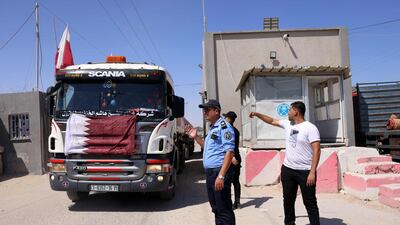Gaza’s only power plant is expected to fire up its third generator on Monday after Israel allowed the first shipments of fuel to enter the enclave since an 11-day war broke out in May.
Seventeen lorries of fuel, funded by Qatar, crossed through the Karem Shalom crossing in the south of the Gaza Strip on Monday.
“The entry of fuel to Gaza will support the capacity of the power plant with additional 20-25 megawatts,” said Mohammed Thabet, spokesman for Gaza’s main power distribution company.
Before the fuel arrived, Gaza’s two million people were receiving about six hours of electricity at a time, followed by eight hours of power cut.
Mr Thabet said the fuel delivery would allow the Gaza Power Generating Company to deliver about eight hours of electricity followed by eight hours of power cut.
He said Gaza needed about 500 megawatts of electricity for 24 hours of supply, but now receives only 300 megawatts.
To make up for the shortfall, Gazan homes and businesses rely on generators.
Since 2007, the Gaza Strip has been under a crippling Israeli blockade that deprived its population of many vital commodities, including fuel.
On May 10, as the deadly conflict between militants in Gaza and Israel began, Israel banned all non-food commodities entering the enclave.
The severe power and fuel shortage has reached a critical point in Gaza, endangering essential services including health care, wastewater treatment and water provision.
"The three water-treatment plants in the Gaza Strip are running at 40 to 50 per cent of their capacity because the shortage of power," Munzer Shublak, the head of coastal municipalities' water utilities, told The National.
"And instead of providing services to half a million people, we are only able to give service to 150,000."
Mr Shublak said the electricity shortages created problems for treating water safely and said plants had to close for four full days after the bombardment.
This meant wastewater flowed directly into the sea.
“Any increase in electricity will improve the work of the wastewater treatment plant and give people of Gaza the chance to swim in the sea safely,” he said.
“To provide people with water daily I need around 16 hours of electricity.
“Now, with the eight hours from the power plant added to four hours from generators, we can provide water for people day after day."
The shortage of electricity also affected health care.
Bassam Al Hamadeen, general manager of engineering and maintenance at the Health Ministry in Gaza, said diagnostic tools such Cat scans and MRI machines could not be used.
“Shortage of power forced us to not work at full capacity and provide our services, especially the morning shift," Mr Al Hamadeen said.
"Also, sometimes the medical crew worked according to the electricity hours, which leads to instability in work shifts and affects the quality of service."
He said maintenance crews must be present at hospitals round the clock to maintain the generators, because any drop in power would affect patients.
The fuel delivery “will guarantee the work of hospitals for longer hours, that leads to stable the work and services of the hospitals", Mr Al Hamadeen said.
Mamdouh Abu Hassira, who owns a restaurant on Gaza's beachfront, estimated that being able to rely on state electricity instead of generators would save the equivalent of $70 a day.
“I used to freeze some seasonal fruits for juice, but with the continued electricity cuts those fruits spoil because I can’t power the freezer from the generator,” Mr Abu Hassira said.
Sharhabeel Al Ghareeb, an analyst, told The National: "To prevent fuel entering Gaza for electricity is one of the Israeli methods to pressure [Gaza's militant rulers, Hamas].
"They used to follow this method for a long time, to prove that the Israeli policy is the same even with the differences of Israeli leaders.
“Israel may be trying to influence Palestinian public opinion to not accept Palestinian resistance groups in Gaza, but those attempts didn’t improve its success."

